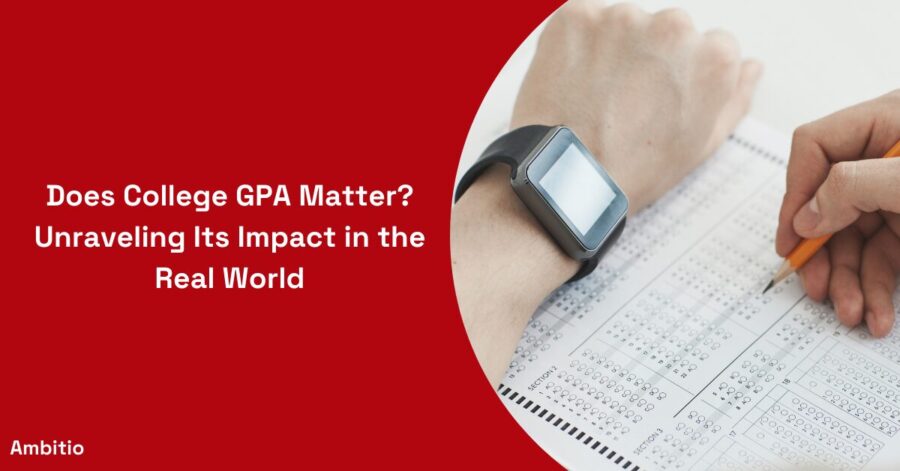12 December 2024
6 minutes read
Does College GPA Matter? Unraveling Its Impact in the Real World

Introduction
The question of whether college GPA matters is a perennial one, with students and professionals often debating its significance.
A good GPA, typically considered to be around 3.0 or higher, is not just a measure of academic success; it reflects a student’s ability to manage workload, demonstrate consistency, and showcase intelligence and work ethic.
This blog delves deep into the multifaceted nature of college GPAs and their relevance in various aspects of life, from academia to the real world.
The Significance of a College GPA
College GPA as a Reflection of Academic Commitment
Understanding the Importance of a Good GPA in College
A college GPA is often seen as a direct reflection of a student’s commitment and understanding of their course material. Colleges and universities use GPA to assess a student’s grasp of the curriculum.
A good GPA, usually 3.0 or higher, is indicative of a student’s diligence and aptitude. It’s essential to recognize that a GPA is more than a number; it’s a testament to a student’s ability to balance academic responsibilities, extracurricular activities, and, in many cases, part-time work.
A high GPA can open doors to honor societies, prestigious internships, and research opportunities, enhancing a student’s academic and professional profile.
The Value of a Strong GPA in Academic Settings
In academic circles, a strong GPA is a valuable asset. It’s often a qualifying factor for academic honors, scholarships, and advanced study opportunities. For students interested in pursuing honors programs or research projects, maintaining a high GPA is crucial.
These opportunities not only enrich a student’s academic experience but also bolster their resume for future endeavors. Furthermore, a strong GPA is essential for students aiming for postgraduate education.
Most graduate schools have a minimum GPA requirement, and a higher GPA can significantly improve the chances of admission to competitive programs.
GPA and Career Prospects
| GPA Range | Impact on Job Market | Relevance in Different Industries | Impact on Graduate School Admissions | Long-term Career Impact |
|---|---|---|---|---|
| Below 2.5 | Limited job opportunities; may need to rely more on networking and skills outside of academia. | Less relevant in skill-focused industries; more impact in academic or research-oriented fields. | This may be a significant hurdle; strong test scores and exceptional letters of recommendation are required. | Diminishes over time; work experience and skills become more important. |
| 2.5 – 3.0 | Moderate opportunities; some competitive positions may be inaccessible, but potential for success with strong skills and experience. | Varies by industry; more emphasis in fields like finance and engineering, less in creative or trade sectors. | Possible challenges; need to supplement with strong test scores, experience, and recommendations. | Can be mitigated with professional experience and achievements; which are less relevant with time. |
| 3.0 – 3.5 | Good opportunities; meets the threshold for most entry-level positions and internships, favorable for graduate school applications. | Generally important across industries; particularly beneficial in technical, finance, and healthcare fields. | Generally favorable; competitive for many programs, especially with strong personal statements and recommendations. | Positive impact early in a career; becomes less critical as professional experience accumulates. |
| Above 3.5 | Excellent opportunities; highly favorable for competitive roles, internships, and graduate programs. | Highly important in most industries; particularly advantageous in academia, research, and highly specialized fields. | Highly favorable; strong candidate for most programs, including top-tier schools. | Strong initial advantage; long-term impact varies but generally becomes less crucial over time. |
How Employers View College GPA
In the job market, especially for entry-level positions, a good college GPA can be a significant differentiator. Employers often view a high GPA as an indicator of a candidate’s potential for success.
This is especially true in fields that require technical knowledge or analytical skills, such as finance, engineering, or science. A high GPA can suggest to an employer that the candidate is hardworking, detail-oriented, and capable of managing complex tasks.
However, it’s important to note that the emphasis on GPA varies across industries and even among companies within the same industry. In creative fields or those that prioritize practical skills, a GPA might be less critical.
The Impact of GPA on Internships and Early Career Opportunities
For recent college graduates, a good GPA can be a crucial factor in securing internships and entry-level positions. Internships are not only opportunities to gain practical experience but also a stepping stone to full-time employment.
Many prestigious internships use GPA as a screening tool, and a higher GPA can increase the chances of selection. Moreover, in the early stages of one’s career, when professional experience is limited, a good GPA can compensate by indicating the individual’s learning potential and work ethic.
However, as one gains more experience in the workforce, the importance of GPA tends to diminish, giving way to practical skills and professional achievements.
Beyond Academics: The Broader Impacts of College GPA
GPA and Its Role in Scholarship and Financial Aid Eligibility
For many students, scholarships and financial aid are crucial for accessing higher education. A good GPA is often a key eligibility criterion for these financial supports. Merit-based scholarships, in particular, typically set a GPA threshold.
Maintaining a strong GPA can not only help secure initial financial support but also ensure its continuation throughout college. For students reliant on scholarships, a good GPA is thus not just a mark of academic success but a financial necessity.
Similarly, some forms of federal financial aid require students to maintain a minimum GPA to continue receiving assistance.
The Long-Term Impact of GPA on Professional Growth
While a college GPA is significant in the early stages of a career, its long-term impact can vary. In certain professions, particularly those that are research-oriented or academic in nature, a strong GPA remains relevant throughout one’s career.
However, in many industries, professional experience, skills, and achievements gradually eclipse academic performance as career determinants. For experienced professionals, how they have applied their education in the real world often matters more than their grades in college.
Nonetheless, a good GPA can open initial doors to opportunities that build valuable experience, thereby indirectly influencing long-term career growth.
Navigating the World with a Low GPA
Strategies for Overcoming a Lower College GPA
Overcoming a lower college GPA requires a strategic approach that focuses on showcasing your strengths in areas outside of academic performance. Here are key strategies to consider:
- Gain Practical Experience: Engage in internships, part-time jobs, or volunteer work relevant to your field of interest. This hands-on experience can demonstrate your practical skills and commitment to your field, making you a more attractive candidate to employers.
- Develop Specific Skills: Identify and develop skills that are highly valued in your industry. This could include technical skills, like coding or data analysis, or soft skills, like communication and teamwork. Certifications or online courses can also bolster your skill set.
- Build a Strong Professional Network: Networking can open doors that a GPA alone might not. Attend industry events, join professional organizations, and connect with alumni or professionals in your field. Building relationships can lead to job referrals and valuable advice.
- Create a Compelling Portfolio or Project Showcase: If you’re in a field where tangible work can be showcased (like design, writing, coding, etc.), build a portfolio that demonstrates your capabilities. Highlight any projects or assignments where you excelled.
- Excel in Standardized Tests (if applicable): For those considering graduate school, excelling in relevant standardized tests (like the GRE, GMAT, or LSAT) can compensate for a lower undergraduate GPA.
- Focus on Personal Statement and Letters of Recommendation: When applying for jobs or graduate programs, a well-written personal statement or strong letters of recommendation can greatly enhance your application. These should highlight your strengths, work ethic, and how you’ve overcome challenges.
- Show Continuous Improvement: If your GPA improved over the course of your college career, make sure to highlight this. It demonstrates your ability to learn, adapt, and improve, which is highly valued by employers and graduate schools.
- Be Prepared to Discuss Your GPA: If asked about your GPA in an interview, be honest but focus on what you’ve learned from the experience and how you’ve grown since then. Emphasize your strengths and how you’ve compensated in other areas.
- Leverage Extracurricular Activities: Involvement in extracurricular activities, especially in leadership roles, can show that you’re well-rounded and have developed skills outside the classroom.
- Consider Additional Coursework: If relevant, consider taking additional courses (either in a formal education setting or online) to improve your knowledge and possibly your GPA, showing your commitment to continuous learning.
- Focus on Work Ethic and Attitude: Employers often value character and work ethic as much as, if not more than, academic performance. Demonstrating a positive attitude, resilience, and a strong work ethic can go a long way.
By focusing on these strategies, you can mitigate the impact of a lower GPA and showcase yourself as a well-rounded, skilled, and capable individual.
Conclusion
In sum, while a college GPA does matter, especially in the early stages of one’s academic and professional journey, it doesn’t define everything. Its importance varies across different fields and diminishes over time as experience and skills take precedence.
Ultimately, a blend of academic performance, practical experience, and continuous personal and professional development shapes one’s career and life trajectory.
FAQs
Q1: Can a low GPA prevent you from getting a job?
While a low GPA might be a hurdle in certain industries, especially for recent graduates, it’s not a definitive barrier. Building practical experience, skills, and a strong professional network can offset a lower GPA.
Q2: Is GPA important for non-academic careers?
The importance of GPA varies across careers. In non-academic fields, especially those that prioritize practical skills and experience, GPA might be less critical than in academic or research-oriented careers.
Q3: How can I improve my job prospects if I have a low college GPA?
To improve job prospects with a low GPA, focus on gaining practical experience through internships, networking, developing in-demand skills, and showcasing your achievements and projects in your field.

You can study at top universities worldwide!
Get expert tips and tricks to get into top universities with a free expert session.
Book Your Free 30-Minute Session Now! Book a call now




























